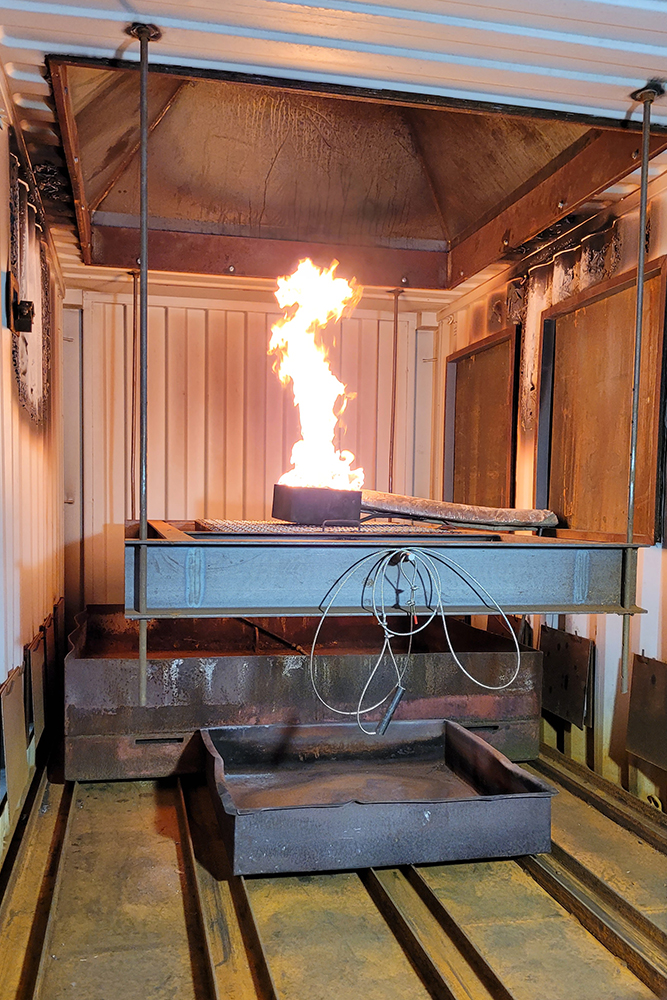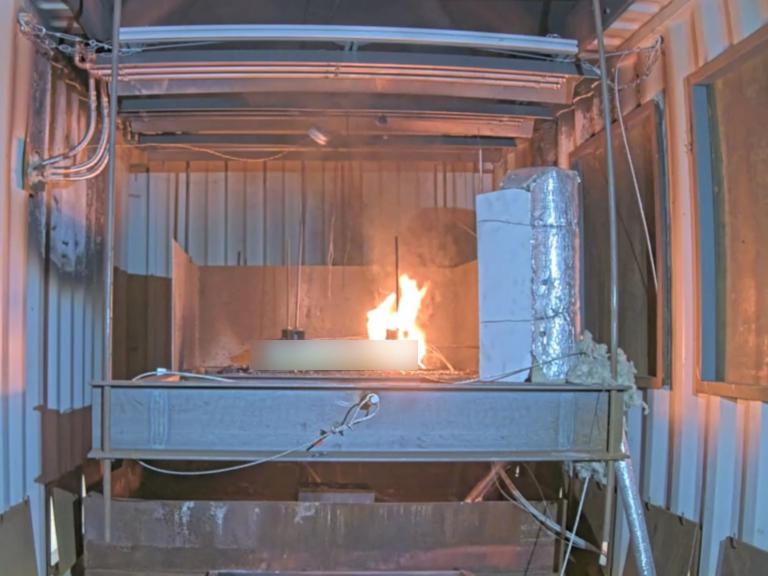When the battery goes up in flames Fire tests at the Center of Fire Safety Research (ZeBra)
Fortunately, fires involving stored batteries are very rare. However, they can be caused by technical defects or external ignition sources. At a battery company in Vorarlberg, Austria, for example, all the batteries in the warehouse ignited within a very short time, resulting in a major fire. In a joint project with the Munich Fire Brigade and the Bundesanstalt für Materialforschung und -prüfung (Federal Institute for Materials Research and Testing), scientists from the Institute of Building Materials, Concrete Construction and Fire Safety (iBMB) at TU Braunschweig are investigating how quickly a fire spreads from densely stored lithium-ion traction batteries and how this spread can best be limited. The first experiments in the Center of Fire Safety Research (ZeBra), and thus the first battery fire tests, have now taken place in the new experimental hall.

Propane gas flame in the calibration burner. A preliminary measurement for further fire tests with batteries. Photo credit: iBMB/TU Braunschweig
The scientists used the K5 battery calorimeter at ZeBra for the test series. A total of twelve storage modules from electric vehicles provided by three different German car manufacturers were used in the project.
The researchers triggered the fires by overheating with a hotplate, in a fire situation with a propane gas flame and by mechanical damage by hammering a nail into the battery module. The temperatures at the surface of the battery module and in the surrounding area, the thermal radiation from the reacting modules and the total amount of energy released were measured. The gas composition in the flue gas stream was also determined and the mass of the battery body was recorded throughout the experiment. The scientists also installed several early fire detection systems in the fire chamber. A thermal imaging camera was also used.
Several hours of warm-up
First interim conclusion: The provocation of the “thermal runaway” of the battery bodies was sometimes very long, in some cases several hours of warming up were necessary in the chosen setup. The fire behaviour of the battery bodies, especially the module bodies heated by a hotplate or propane gas flame, was short but very intense. The fire spread more slowly from battery cell to battery cell in modules that were ignited by mechanical damage. In some tests there was no ignition at all.

A total of twelve storage modules from electric vehicles were used in the K5 battery calorimeter at the Center of Fire Safety Research (ZeBra). The battery used is not allowed to be shown in the picture. Photo credit: iBMB/TU Braunschweig
But why do these fires occur at all? “It cannot be completely ruled out that battery modules may have internal defects that could lead to ignition, either as a result of the manufacturing process or, in particular, after damage. If these critical batteries are not stored separately in safe areas with appropriate measures, ignition can lead to flashover to other stored batteries. In the current project, we are experimentally investigating how this fire spread can be successfully prevented in the storage situation,” says project team member Justus Frenz (iBMB). Project leader Professor Jochen Zehfuß of the iBMB points out that “fires also occur independently of the batteries. In mixed storage systems, the modules are not necessarily the cause of the fire, but they are involved in the subsequent fire.”
The results and experiences of the first test series will be incorporated into the test planning of the second and third test series of the project “Controllability of large-scale fires in industrial halls with the hazardous material high-voltage storage and their propagation models – (BEGIN-HVS)”. In the overall project, the results of the first test series will be incorporated into the development of safety concepts and guidelines for fire protection authorities for dealing with fires involving high-voltage storage systems, which will be prepared by the Munich Fire Brigade as project coordinator towards the end of the project.
About the project
The BEGIN-HVS project is funded by the Federal Ministry of Education and Research (BMBF) as part of the “Research for Civil Security” programme under the funding measure “Anwender – Innovativ: Forschung für die zivile Sicherheit II” (User – Innovative: Research for Civil Security II) with more than1 million euros under the funding codes 13N16603 – 13N16605 and will run from 1 May 2023 to 30 April 2025.
